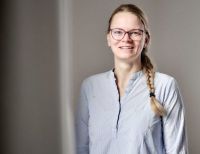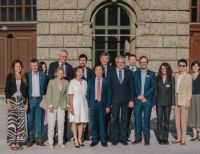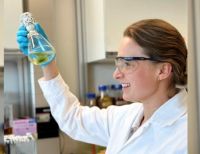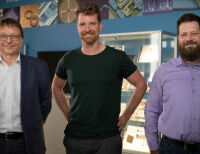
Albert Einstein as Student at the Polytechnic, 1898
(Illustration: Oculus Illustration / ETH Library Zurich, Image Archive)
Albert Einstein started studying at ETH, which was known as the Zurich Polytechnic at the time, in October 1896. At just 17 years of age, he was one of the youngest students. He studied there for four years, focusing on physics and mathematics, but also taking courses in literature and history. Time and time again, he had to be content with being awarded mediocre marks because – as he recalled in his memories of ETH in 1955 – to be a good student “you must be able to grasp things easily; you must be willing to concentrate your energies on everything you are told in the lectures; you must enjoy writing down everything presented in the lectures in an orderly fashion and working on it conscientiously. Regretfully, I realised that I fundamentally lacked all these qualities.” What the young Einstein, who described himself as a “vagabond and a loner”, did have, however, was an insatiable enthusiasm for the physical theories and problems of his time. As these topics were not really taught at ETH at that time – Maxwell’s theory of electromagnetism and Boltzmann’s theory of thermo-dynamics, for example, were both absent from the syllabus – Einstein studied them independently instead. “Even at a very young age, Einstein had a profound thirst for knowledge. He wanted to get to the bottom of things that were not understood at the time and he really challenged the existing physical paradigms,” explains Hans Rudolf Ott, Professor Emeritus of Physics at ETH.
The fact that Einstein managed to graduate at the age of 21, despite his lack of enthusiasm for the curriculum, was in part down to his friend, mathematics student Marcel Grossmann. As Einstein often skipped classes, he relied on Grossmann’s meticulous lecture notes to help him through his studies. However, this wasn’t enough to secure him a good mark at the end of his degree. With an average of 4.91, Einstein’s mark was the second lowest in his class and he was the only student not to be offered a role as a research assistant.
Annus mirabilis in Bern
After graduating from ETH, Einstein took on various odd jobs in order to keep money coming in, including as a tutor in Bern. It wasn’t until June 1902 that he found a position as a technical expert at the patent office in Bern on the recommendation of Grossmann’s father. There, far from the academic establishment and working in his free time, Einstein published no fewer than 33 works in the period up to 1909. These included his most important works on the special theory of relativity and on the light-quantum hypothesis, for which he would later win the Nobel Prize.
It was these publications, several of which turned the world of classical physics on its head, that finally opened up the possibility of a university career for him after numerous disappointments and setbacks: after two years as a professor at the University of Zurich and one year in Prague, Einstein returned to his alma mater, ETH, as Professor of Theoretical Physics in 1912 at the age of 33. “Hallelujah!” wrote Einstein from Prague to his friend, ETH history professor Alfred Stern, when the long-awaited call from Zurich finally came.
Zurich’s contribution to the theory of relativity
















